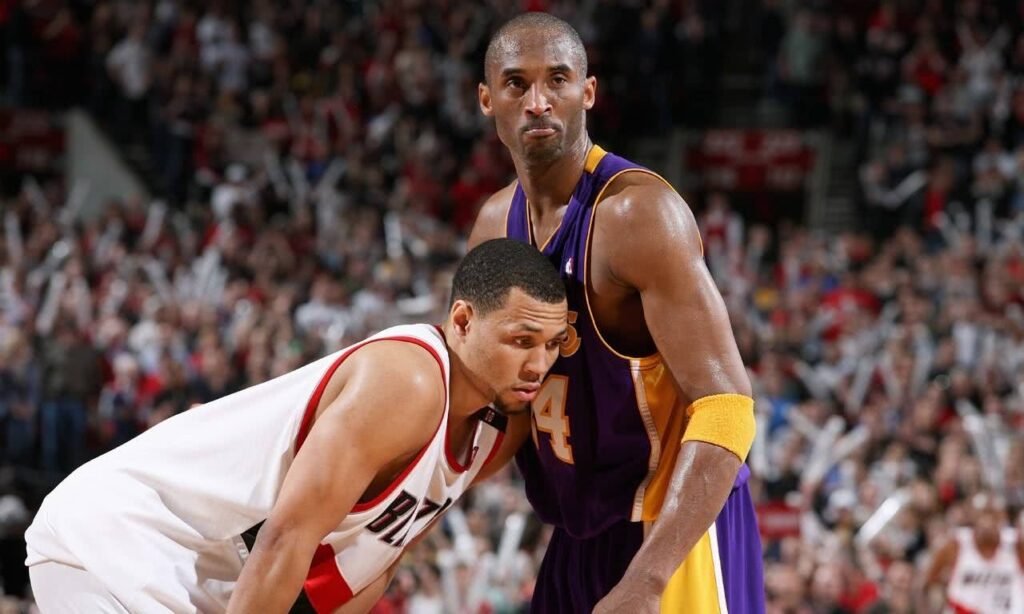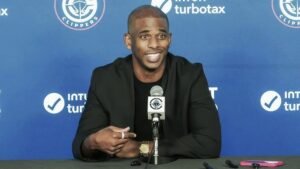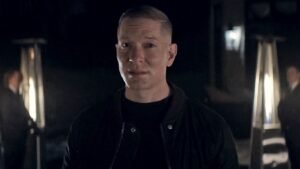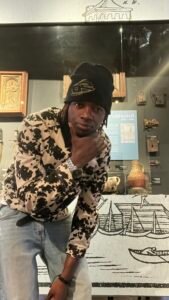Brandon Roy Reflects on Kobe Bryant’s Undeniable Legacy Amid Ongoing Negative Narratives
Brandon Roy praises Kobe Bryant’s unmatched basketball legacy, emphasizing his championships, work ethic, and influence despite controversies.

Brandon Roy honors Kobe Bryant, calling his basketball legacy “irreplaceable” [Twitter]
In an age where social media and revisionist narratives frequently alter public opinion, former NBA star Brandon Roy recently reminded fans of an essential truth: “The real ones know the legacy that Kobe Bryant, left on the game of basketball. That can’t be erased from the history books.”
Roy’s comments, which were revealed to LandonBuford.com at The Rise Above Youth Clinic at Garfield High School earlier this summer, come during a renewed discussion on Kobe Bryant’s complicated legacy.
Kobe Bryant’s Greatness Under Fire: The Growing Wave of Negative Narratives
Bleacher Report and other analytical platforms have ranked Bryant outside the top ten players of all time, leading to outrage among fans and former players. Some question why a player with five championships, two Finals MVPs, and an 18-time All-Star résumé is not ranked higher than less accomplished contemporaries. The increasing priority of analytics over legacy in evaluating greatness is reflected in these changes in perception.
The Origins of the “Sidekick” Narrative
After leaving high school in 1996, Kobe Bryant was drafted by the Charlotte Hornets, but was later traded the Los Angeles Lakers. The franchise recently added Shaquille O’Neal through free agency, who was already one of the league’s most dominant forces. Shaq’s immense personality and unstoppable inside game made him the cornerstone of the franchise, which naturally shifted the power dynamic in his favor. During the early 2000s, when the Lakers were trying to win titles, the media often depicted Bryant as O’Neal’s apprentice or ‘sidekick’.
Despite the convenience of this framing, the rapid transformation of Kobe from a promising young talent into a co-star who holds vast offensive responsibilities was overlooked. Bryant’s clutch performances and defensive intensity were crucial during the team’s first championship run in 2000, complementing Shaq’s dominance in the paint. The ‘sidekick’ label reflected more of the narrative simplicity that sports fans crave than the complex reality unfolding on the court—a partnership driven by two superstars whose combined excellence reshaped the NBA’s power structure.
Former Los Angeles Lakers guard Ron Harper, a teammate of Bryant’s, isn’t a fan of the narrative. Stop with the BS. Kobe wasn’t a sidekick for sure!!!! He shared on X last Christmas Eve.
Derek Fisher, who was Bryant’s running mate through all five NBA Finals victories, shared with Gilbert Arenas the reason they didn’t win a fourth ring was that Shaq was ready to embrace the second option role.
“So he (Fisher) says, ‘We would have won the fourth won, if it was still Shaq in front’ because Shaq in front, he plays his game. Kobe was going to do Kobe no matter what. Shaq wasn’t ready to be number two and that hurt his feelings and because it hurt his feelings, he wasn’t around,” highlighted Arenas, who also felt the same about the situation.
From Conflict to Coexistence
The tension between Bryant and O’Neal was simmering behind the banners and rings as they both sought recognition as the true leaders of the Lakers. Kobe’s tireless work ethic and desire to be recognized as an equal sometimes conflicted with Shaq’s more laid-back approach.
The outcome was a relationship that was both volatile and productive, challenging the boundaries of teamwork and ego. Their synergy on the court was evident, despite some friction. Bryant had open opportunities to score due to O’Neal’s double teams inside, but Kobe’s perimeter scoring and late-game shot-making helped hide Shaq’s free-throw weaknesses.
Their collaboration resulted in one of the most formidable duos in NBA history. Kobe had clearly outgrown the notion of supporting acts by the time their partnership ended. His two championships without Shaq, coupled with his leadership transformation, reframed the legacy of their shared era, not as one man carrying another, but as two icons whose competitive fire pushed each other toward greatness.
The early 2000s Lakers team’s dominance and drama make it easy to recall, but the story of Kobe Bryant and Shaquille O’Neal is much more complex than just a story of superstar hierarchy.
Their relationship was a study in contrast, marked by power and precision, size and skill, charisma and calculation. Understanding their legacy means looking beyond the ‘sidekick’ headlines and exploring how their evolving relationship shaped both their careers and the Lakers’ place in NBA history.
Shaq’s Respect for Kobe’s Greatness
Shaquille O’Neal has made it a point to debunk the myth that Kobe Bryant was only his sidekick during the Lakers’ championship run over the years. In multiple interviews, O’Neal has emphasized that Bryant was “not your average passenger”—a homage to Kobe’s rare ability to dominate games, particularly during crucial playoff moments.
View this post on Instagram
During their championship years, Shaq stated that Kobe was the best player in the world, a statement that contradicts the long-held belief that Bryant was a secondary star. Kobe’s leadership and poise under pressure have been praised repeatedly by O’Neal.
Shaq infamously stated in 2001 that Robin had never been considered the best player in the world, recognizing the times when Bryant led the Lakers when foul trouble or defensive strategies limited O’Neal’s dominance. Despite their publicized disagreements, Shaq has remained consistent in one message: he would not have won those championships without Kobe.
According to O’Neal, Kobe had the potential to win Finals MVP honors during any of those title campaigns, as Phil Jackson’s plan frequently relied on Bryant to win tight playoff games. Shaq and his team’s success was not the result of one man leading another but rather two exceptional talents pushing each other to achieve basketball immortality.
Brandon Roy’s Tribute: A Player’s Perspective on Unmatched Dedication
Brandon Roy, known for his graceful game and intellectual leadership during his prime, has always held Bryant in the highest regard. Having faced the ‘Black Mamba’ multiple times during his playing career, Roy’s firsthand experience adds credibility to his statement.
“The real ones know the legacy that Kobe Bryant, left on the game of basketball. That can’t be erased from the history books.”
Roy’s words are meaningful because they come from someone who comprehended the competitive drive that defined Bryant. Roy’s reflection is not only a sentiment of nostalgia but also a reaffirmation of respect between two elite competitors.
Bryant was not only a superstar for Roy and countless other players, but he was also a standard of excellence, a mentor, and a symbol of relentless ambition that influenced an entire generation of athletes.
Kyrie Irving’s Passionate Defense: “I’m Not Letting People Revise History”
A recent Twitch livestream featuring Kyrie Irving, one of the NBA’s most outspoken players, echoed similar sentiments. His message was clear and powerful:
“I’m not letting people come on and talk about Kobe like Kobe wasn’t one of the best that not only played, but that came in as a 17-year-old against grown men. And by the time this man was 22 years old, he had a few championships, and he was busting the best of the best’s a**. If y’all don’t knock that s**t off.”
Irving made a direct reference to the ‘media talking heads’ and analysts who casually diminish Bryant’s career achievements. His defense highlighted not only Kobe’s early success, entering the league as a teenager and winning multiple championships before age 25, but also the fearless mentality that defined his approach to the game. Irving and those who admired Bryant are dedicated to preserving the legacy that has influenced modern basketball culture, from work ethic to mentality, rather than only defending a basketball résumé.
The 2003 Colorado Case: The Lingering Shadow on Bryant’s Story
Kobe Bryant’s legacy cannot be discussed without acknowledging the 2003 sexual assault allegation in Colorado, which is still a controversial and painful chapter in his life and public discourse. Although the charges were ultimately dropped due to the accuser’s refusal to testify, the case left a lasting impression on Bryant’s image. Critics contend that mainstream basketball culture frequently views the case as an obstacle that Kobe “overcame” rather than confronting its more profound social and moral implications.
The issue resurfaced during pivotal moments of his post-retirement career, including his Academy Award win for Dear Basketball, which reignited public debate over how society reconciles greatness with moral complexity. For many fans and fellow players, Kobe’s actions following the case —his public apology, dedication to his family, and philanthropic work —are viewed as a tale of growth and redemption that reflects the complexity of human imperfection.
The Polarizing Genius: Team Conflicts, Arrogance, and Ruthless Drive
Bryant’s relentless pursuit of excellence led him to appear cold, demanding, and even arrogant throughout his 20-year career. His defining stories were his fights with Shaquille O’Neal, conflicts with coaches, and unwavering competitive spirit. However, these characteristics also gave rise to the Mamba Mentality, a philosophy that motivated millions to exceed their limits.
Bryant’s off-court controversy, which included his use of a homophobic slur during a game and endorsement deals with politically controversial brands, further intensified public discussion. His supporters view these missteps as a testament to his human complexity, rather than a sign of his downfall. In an era where public figures are often both deified and demonized, Kobe emerged as a flawed, driven, and evolving icon whose transparency about his growth made him relatable.
The Digital Era and the Battle Over Legacy
Bryant’s tragic death in 2020 has caused a surge in discussions about his legacy. Fans, journalists, and analysts are debating his place among legends such as Michael Jordan, LeBron James, and Kareem Abdul-Jabbar on online platforms like Reddit, Twitter, and YouTube. Bryant’s passing, ironically, has made him a target for contrarian views and revisionist analysis. Some contend that his legacy has been exaggerated due to emotion.
In contrast, others claim that it is being unfairly dismantled by metrics-driven discourse that neglects intangibles, including leadership, mentality, and cultural impact. Documentaries and retrospectives continue to highlight the dichotomy of darkness and redemption in Kobe’s journey. His story is not limited to basketball; it reflects the complexities of legacy in the digital age.
Preserving the Mamba Legacy: What the Real Ones Know
Players like Brandon Roy and Kyrie Irving defend Kobe Bryant not just for nostalgia, but to ensure that future generations understand his impact. The eternal pursuit of mastery is represented by Kobe’s obsessive work ethic, championship pedigree, flaws, and growth. As Roy put it, “The real ones know.”
Landon Buford is an accomplished sports and entertainment journalist based in Richardson, Texas, with over a decade of experience covering the NBA, WNBA, NFL, WWE, MLB, and the entertainment industry. Known for delivering high-impact stories and headline-making interviews, Buford has earned a global audience through content that blends insider access with compelling storytelling.
He previously served as director of editorial and brand communications at PlayersTV, where he helped shape the platform’s editorial voice and brand identity. He is also the founder and editor-in-chief of LandonBuford.com—an independent outlet with more than 1.6 million views and syndication from major platforms including Bleacher Report, Sports Illustrated and Yahoo Sports. Buford’s interviews with stars like Gary Payton, Kevin Durant, Mark Cuban and Chris Paul showcase his talent for meaningful, in-depth conversations.
His bylines have appeared in Sports Illustrated, Forbes, Heavy.com, Meta’s Bulletin and One37pm, where he has contributed exclusive interviews, breaking news and cultural insights. At Heavy.com, his work drew more than a million views in just eight months, and at One37pm, it contributed to record-breaking traffic numbers.
His work highlights the intersection of sports, fashion, music, and entrepreneurship—showcasing how athletes and entertainers use their platforms to inspire change, influence trends, and shape culture beyond the game. Landon has interviewed a wide range of figures from the NBA, NFL, and entertainment industries, consistently bringing authentic voices and untold stories to the forefront.
In addition to his journalism, Buford is an entrepreneur and content creator, dedicated to amplifying diverse narratives and driving meaningful conversations across media platforms. His passion for storytelling, culture, and innovation continues to make him a respected voice in the evolving landscape of sports and entertainment media.







